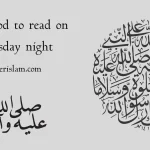Dua in Islam carries immense significance. It is commendable for Muslims to engage in frequent dua. Because it acts as a direct medium of communication with Allah. Among the various times and places recommended for making Dua, Dua after Fajr Sunnah 100 times holds a special place in the hearts of believers.
Dua and Tasbeeh 100 times after Fajr prayer has special significance and benefits. For it is a time when the world is still and quiet, and the connection between worshipers and their Creator feels especially intimate. Within this serene window comes the opportunity to indulge in dhikr or remembrance of Allah through the repetition of specific prayers.
One practice that carries special significance is repeating a particular dua 100 times after the Fajr prayer. This practice is rooted in the Sunnah of the Prophet (PBUH). who emphasized the importance of dhikr and prayer throughout his life.
Dua after Fajr prayer
- “Subhanallah” (Glory be to Allah) 33 times,
- “Alhamdulillah” (Praise be to God) 33 times,
- “Allahu Akbar” (Allah is the Greatest) 34 times.
By reciting this dua and tasbeeh we not only fulfill a proposed act of worship. Rather, by immersing ourselves in the spiritual atmosphere of dawn, we can set a positive tone for the rest of the day.
The significance of this practice lies in its ability to instill mindfulness, gratitude and reverence in our hearts. Each phrase of dua reflects a fundamental aspect of faith.
Meaning and interpretation of Sunnah 100 times Duas
“Subhanallah” Allah is holy. It acknowledges the incomparable perfection and holiness of Allah.
“Alhamdulillah” All praise be to Allah. It expresses gratitude for our countless blessings.
“Allahu Akbar” Allah is the greatest. It proclaims the supremacy and supremacy of Allah above all things.
By repeating these Tasbeehs, we can recite the greatness of our Creator. May we develop a deep awareness of His help in our lives.
The practice of reciting this 100 times dua after the Fajr Sunnah prayer serves as a form of spiritual purification. It allows us to start their day with a clear heart and a renewed sense of purpose. By acknowledging Allah’s greatness and expressing gratitude for His blessings, all are reminded to approach the day with humility and sincerity.
Benefits of 100 times Dua after Fajr

Repetition of Duar after Fajr prayer brings many spiritual benefits. It attracts blessings, helps ward off negative influences and increases spiritual strength. Being engaged early in the morning is believed to have a profound effect on one’s state of mind and overall well-being.
In a world full of confusion and challenges, the practice of reciting dua after Fajr prayer provides us with a sanctuary of peace and tranquility. It is time to disconnect from the noise of the world and reconnect with the essence of their faith. Devoting this precious time to the remembrance of Allah finds solace and strength to face the trials of life with steadfast faith and resilience in Allah.
Some more dua to recite after Fajr
- To get rid of Hellfire, recite Dua Aati 7 times after Fajr and Maghrib prayers.
اللَّهُمَّ أَجِرْنِي مِنَ النَّارِ
Pronunciation: Allahumma Ajirni Minnan Nar.
Meaning: O Allah! Deliver me from hell.
Virtues: It is mentioned in the hadith that a person who recites the following dua seven times without talking to anyone after Fajr and Maghrib and dies on that day or night will be released from hell. Abu Dawud, Hadith: 5079.
- Surah Ikhlas, Falaq and Surah Nas, 3 times each, after Fajr and Maghrib. Virtues: Rasul SAW. He said, if you read them in the morning and evening, it will be enough to protect you from all kinds of evil. Tirmidhi, Hadith No. 3575.
- Read 3 times after Fajr and Maghrib. Meaning: I worship Allah as Lord, Islam as God and Muhammad. Who is pleased to have as a prophet.
- Recitation of Sayyidul Istighfar
اللَّهُمَّ أَنْتَ رَبِّي لاَ إِلَهَ إِلَّا أَنْتَ، خَلَقْتَنِي وَأَنَا عَبْدُكَ، وَأَنَا عَلَى عَهْدِكَ وَوَعْدِكَ مَا اسْتَطَعْتُ، أَعُوذُ بِكَ مِنْ شَرِّ مَا صَنَعْتُ، أَبُوءُ لَكَ بِنِعْمَتِكَ عَلَيَّ، وَأَبُوءُ لَكَ بِذَنْبِي فَاغْفِرْ لِي، إِنَّهُ لاَ يَغْفِرُ الذُّنُوبَ إِلَّا أَنْت.
Pronunciation : Allahumma anta rabbi, la ilaha illa anta, khalaqtani, wa ana abduka, wa ana ala ahidka wa wa’dika mastata’tu, auju bika min sharri ma sana’tu, abuu laka bini’matika alaiyya, wa abuu laka bizambi fagfirli Faynahu la yagifruz junuba illa anta.
Meaning: O Allah! You are my Lord. There is no god but You. You created me. And I am your slave. I stand by your promise as much as possible. I seek refuge from the evil of my deeds. I acknowledge your grace upon me. I confess my sin again. So, forgive me. Because no one can forgive sins except you.
Conclusion
The practice of reciting the 100 times Sunnah prescribed dua after Fajr prayer is a deeply spiritual and rewarding endeavor. It is a time to deepen our connection with Allah, cultivate gratitude and mindfulness. May we find peace, blessings and spiritual fulfillment in remembrance of our Creator as we engage in this practice.







